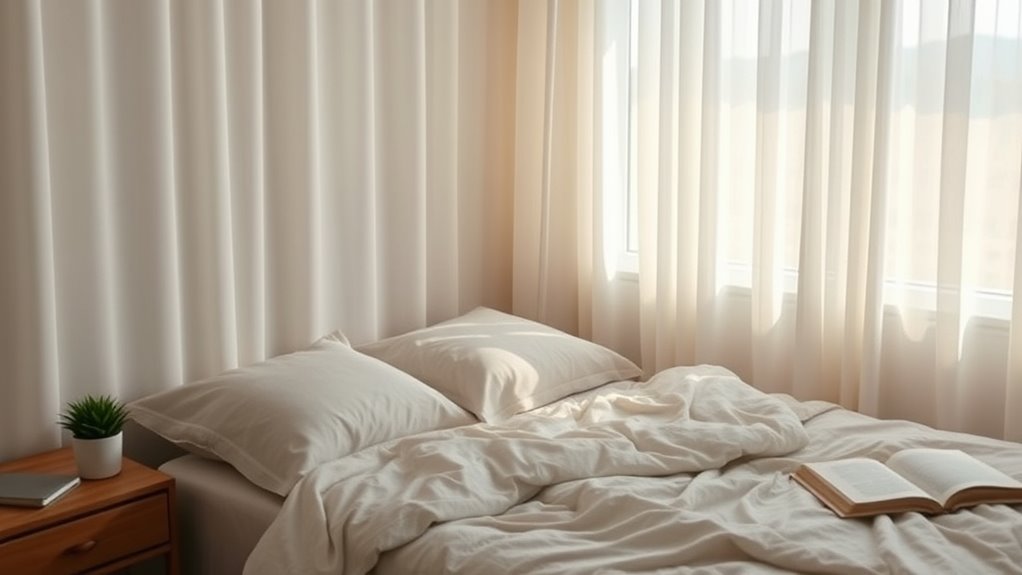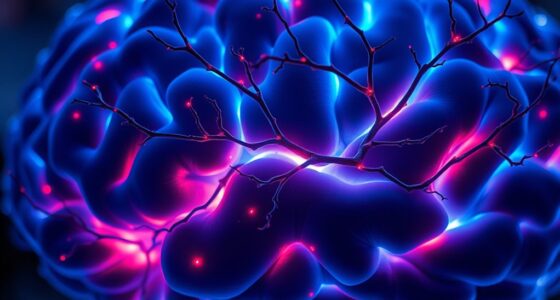Taking a digital detox can boost your mental clarity and focus by reducing digital distractions that fragment your attention. It helps lower anxiety and stress levels by limiting overwhelming notifications and social comparisons. Your sleep improves when you cut screen time before bed, allowing natural rest patterns to restore. It also strengthens your real-life relationships by promoting face-to-face connections and mindful interactions. Keep exploring to discover how these strategies can enhance your overall well-being and emotional resilience.
Key Takeaways
- Reduces mental clutter, enhancing focus, clarity, and problem-solving abilities.
- Lowers anxiety and stress by minimizing overwhelming notifications and information overload.
- Improves sleep quality by decreasing blue light exposure and promoting relaxing routines.
- Strengthens real-life relationships through genuine face-to-face interactions and emotional connection.
- Boosts emotional resilience and mindfulness, supporting overall mental well-being.
Enhancing Mental Clarity and Focus

Have you ever noticed how constant notifications and digital distractions cloud your mind? They fragment your attention and make it hard to focus. Practicing mindfulness can help you regain clarity by training your mind to stay present and aware. Engaging in mindfulness exercises, like deep breathing or meditation, sharpens your cognitive agility, making it easier to switch between tasks and stay concentrated. When you take breaks from screens, your brain resets, reducing mental clutter. This mental clarity boosts your ability to prioritize, analyze, and problem-solve efficiently. Over time, these mindful practices strengthen your focus, helping you maintain better attention even in busy, distraction-filled environments. Additionally, incorporating digital detox strategies can further enhance your mental resilience and overall well-being. Understanding how contrast ratio affects visual perception can motivate you to create more effective environments for mental clarity. For example, reducing digital noise can improve your overall cognitive function, making it easier to stay aligned with your goals and handle complex tasks with greater ease. Ultimately, reducing digital noise allows your mind to function more sharply and stay aligned with your goals.
Reducing Anxiety and Stress Levels

Digital detoxing can considerably reduce anxiety and stress by limiting exposure to overwhelming information and constant notifications. When you’re constantly connected, you’re exposed to social comparison, which can make you feel inadequate or insecure. Seeing others’ highlight reels can amplify feelings of dissatisfaction and anxiety. Additionally, information overload from nonstop alerts and updates keeps your mind racing, preventing relaxation. Taking breaks from screens helps you escape these pressures, allowing your brain to reset and regain calmness. Without the barrage of notifications, you can focus on the present moment and reduce feelings of being overwhelmed. This intentional disconnection promotes mental clarity, lowers cortisol levels, and helps you feel more in control of your emotional well-being. Recognizing the importance of mental health during screen-free periods encourages a healthier balance between technology use and personal well-being. Incorporating protective styling benefits from physical activities like crochet or knitting can also support mental health by fostering creativity and mindfulness during your break from screens. Moreover, engaging in nutritional awareness, such as choosing healthy snacks like apples or blueberries, can further enhance your mood and reduce stress levels during your digital detox.
Improving Sleep Quality and Restfulness

Reducing screen time before bed and disconnecting from devices can considerably improve the quality of your sleep. Blue light emitted by screens disrupts your circadian rhythms, which regulate your sleep-wake cycle. When exposed to blue light in the evening, your body produces less melatonin, making it harder to fall asleep and decreasing sleep quality. By limiting screen use at least an hour before bed, you allow your circadian rhythms to stay aligned, promoting deeper, more restful sleep. Creating a screen-free bedtime routine helps your body wind down naturally. You’ll fall asleep faster and wake feeling more refreshed. Disconnecting from screens not only benefits your sleep but also enhances overall sleep efficiency, ensuring you wake up ready for the day. Incorporating sleep hygiene practices into your sleep habits further reinforces healthy routines and supports your overall well-being. Additionally, avoiding excessive screen exposure in the evening can prevent overstimulation that interferes with your ability to relax and fall asleep.
Strengthening Real-Life Relationships

Although technology makes it easy to stay connected online, it can also create a barrier to meaningful in-person interactions. When you’re constantly glued to screens, you miss out on face-to-face communication, which is essential for building strong emotional connections. Taking a break from digital devices allows you to be fully present with others, fostering genuine conversations and deeper understanding. Without distractions, you can pick up on subtle cues, like body language and tone, that strengthen your relationships. Engaging directly with loved ones helps you develop trust and empathy, creating a more supportive and connected social circle. Recognizing the importance of sustainable transportation can inspire a more mindful approach to technology use and community engagement. Additionally, being aware of electric bike capabilities encourages environmentally friendly choices that benefit both individuals and the community. Incorporating mindful practices, such as digital detox, can further enhance your overall well-being and social bonds. Remember, real-life relationships thrive when you give them your full attention.
Promoting Mindfulness and Emotional Resilience

Practicing mindfulness and building emotional resilience help you stay centered amid the constant flow of digital stimuli. Engaging in mindfulness meditation enhances your ability to observe thoughts without judgment, fostering emotional regulation. This practice strengthens your resilience by helping you respond thoughtfully rather than react impulsively. To support your journey, consider the following strategies:
| Technique | Benefit |
|---|---|
| Mindfulness meditation | Improves focus, reduces stress |
| Deep breathing exercises | Calms the nervous system, enhances emotional regulation |
| Journaling | Clarifies feelings, promotes self-awareness |
In addition, understanding the effectiveness of hydrocolloid technology can inspire you to incorporate soothing techniques into your screen-free time. Integrating these methods into your screen-free periods enables you to cultivate a calmer, more resilient mindset amid today’s digital landscape. Incorporating meditation techniques and mindful awareness practices can also enhance your ability to maintain emotional balance during challenging moments.
Frequently Asked Questions
How Long Should a Digital Detox Last for Optimal Benefits?
You might wonder how long a digital detox should last for the best results. Duration guidelines suggest starting with a weekend or a few days, but it varies based on your screen time and needs. Regular detox frequency, like once a month or biweekly, helps maintain mental clarity and reduces stress. Listen to your body and adjust the length, ensuring the detox fits into your routine for sustained psychological benefits.
Can Digital Detoxing Help With Symptoms of Depression?
Digital detoxing can help reduce symptoms of depression by encouraging more social interaction and improving sleep quality. When you take a break from screens, you’re more likely to engage with others and spend time outdoors, which boosts your mood. Plus, less screen time before bed can lead to better sleep, helping you feel more energized and balanced. Overall, a digital detox supports your mental health and emotional well-being.
Are There Specific Activities Recommended During a Screen-Free Period?
During a screen-free period, you should focus on activities that promote mindfulness and connection. Try mindful journaling to reflect on your thoughts and feelings, helping you stay present. Nature walks are excellent for reducing stress and recharging your mental health. These activities encourage relaxation, improve mood, and foster a deeper sense of well-being, making your screen-free time both enjoyable and beneficial for your overall psychological health.
How Can Digital Detoxes Be Maintained in a Busy Schedule?
To keep digital detoxes manageable in a busy schedule, prioritize time management by setting specific, achievable screen-free periods. Use mindfulness techniques to stay present and reduce the urge to check devices. Schedule activities like walks, reading, or hobbies during these times. By consciously carving out moments for mindfulness and planning ahead, you can maintain your detox without disrupting your daily responsibilities.
What Are the Potential Challenges Faced During a Digital Detox?
Did you know that 67% of people experience tech withdrawal symptoms during digital detoxes? During this time, you might face challenges like social anxiety or cravings for constant connectivity. You could feel restless or disconnected, making it tough to stick with the break. These hurdles are normal, but recognizing them helps you prepare. Staying committed requires patience and gradual changes, so you can enjoy the mental clarity a screen-free period offers.
Conclusion
Imagine a clear lake untouched by storms—a place where your mind can settle and reflect. Taking screen-free breaks is like dipping your toes into that calm, allowing mental clarity to bloom and stress to melt away. As you reconnect with the world around you, you’ll find your emotional resilience strengthening like roots deep in nourishing soil. Embrace these moments of digital silence, and watch your well-being blossom into a vibrant, balanced life.









